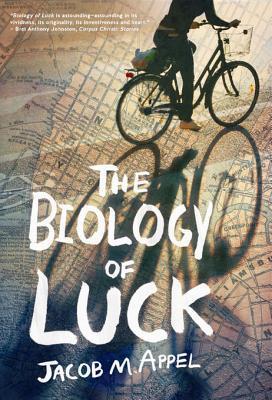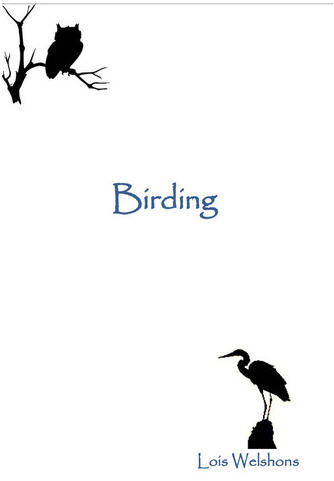
|
WHISTLING SHADE |
(Elephant Rock Books)

Works of literature often seem to operate under their own intrinsic laws of physics, from Austin’s marriage proposals in to Dickens’ coincidences, magic in Garcia-Marquez and dream sequences in Murikami. Jacob Appel’s The Biology of Luck is one of those books that comes with its own special set of forces operating in a quirky interior universe. The novel is like some great mechanical clock that works with curious, sometimes maddening precision.
The setup is fairly straightforward: Larry Bloom, an unbecoming New York City tour guide, is in love with Starshine, a bohemian babe who glides about town on a Higgens bicycle. To win Starshine, Larry has adopted an elaborate strategy: he has written a novel about her (also called The Biology of Luck) chronicling a single day—the day on which he learns the book is accepted by a publisher, the same day he tells Starshine he’s in love with her. Appel’s Biology of Luck opens on this very day and remains there, following Larry as he chaperones Dutch tourists through historic New York, and alternating with chapters from Larry’s book that imagine Starshine as she passes the hours leading up to their all-important dinner engagement that evening.
Like another Bloom, Leopold of Ulysses fame, Larry does get around, and as we watch him navigate his day we feel that we, too, are on a tour, starting in Harlem and wending through Morningside, over the Brooklyn Bridge and on to the Bronx. Starshine, meanwhile, is busy juggling her two lovers, buying a fruit basket for an aged aunt, reporting (briefly) to work at a non-profit, and dodging admirers left and right.
Heads turn as she weaves her way south through Williamsburg. There are the approving smiles of the elderly Italian men playing chess outside their social clubs, the ambivalent leers of caftaned Hasids returning from their morning prayers. Packs of junior high playboys shower her in catcalls. Papaya vendors whistle under their breaths [...] All pay tribute to life’s sole universal truth: A beautiful girl on a bicycle is communal property.
Both Appel’s and Bloom’s Biology of Luck are written in the same sardonic style, piling up line after line of pungent sarcasm in the manner of a stand-up monologue. The more satirical characters include Larry’s friend Ziggy Borasch, an eccentric writer who, despairing of writing the Great American Novel, is now devoted to composing the Great American Sentence; Starshine’s one-armed super, Bone; and His Mystic Eminence, the bishop of the Society for Secular Harmony, who makes a religion out of proclaiming his own self worth by reciting the long list of his vices.
His Mystic Eminence has nearly completed his sermon.
“I have defrauded a prostitute,” he declaims, “and I am a worthwhile person. I have shoplifted a bottle of vermouth, and I am a worthwhile person. I have called my wife a yellow whore behind her back, and I am a worthwhile person.”
The bishop pauses and clears his throat. He is beaming with self-satisfaction.
“Those are my accomplishments for the day,” he says. “I am proud of each and every one of them. I am better than all of you. I will worship no gods before myself. I will value no human beings more than myself. I am the most worthy person I know.”
As Larry and Starshine drift on their separate ways into the belly of the afternoon, an eerie consonance arises between the parallel narratives. For instance, Larry discovers a dead man in a parking lot, but shepherds is tourists away from the corpse to avoid any police entanglements; later on, Starshine learns the wealthy father of her lover Colby Parker had dropped dead in a parking lot. Yet Larry Bloom seems oblivious of the strange forces at work around him, melding his reality with the stuff of his imagination.
A lot happens in The Biology of Luck—women on ledges, girls falling from the parapets, Dutch tourists setting themselves on fire. Yet none of these Marx Brothers antics further the real force propelling he book: Larry’s courting of Starshine. Instead Appel seems to be diverting us until the appointed hour when Larry and Starshine meet at last and the two narratives converge. What happens when our dream world collides with our real world? Is it, perhaps, something we call “luck”?
- Joel Van Valin
Red Bird Chapbooks brings us two new books that exhibit insightful, clever poetry. Both Birding, by Lois Welshon, and Danger Falling Debris, by Howie Good, display a crisp and novel take on events and sights often considered unnoteworthy. This sense of beauty is so welcome in this age of hustle-bustle.
Danger Falling Debris takes a perceptive look at the true depth and tragedy of quotidian interactions and settings. A common life experience is fully explored in “The Fork in My Career Path”:
I was eligible for a full lifetime membership
in the disappearing middle class.
“What’s your mother’s name?”
the man at the computer demanded.
The light from overhead seemed to flutter
as I formulated an answer.
Like a looted corpse’s,
my pockets had been turned inside out.
“Beautiful world,” I silently prayed,
“hold me while I’m naked.”
The poet sees the great tragedy of how one must give up some part of their dignity while being conscripted into the work-a-day world.
Good is also aware of how the environment around us affects our experience of an event. “Autumn Sonata” portrays the full force of the dying month. In this poem, there are morose yet beautiful phrases like “God hid in the attic,” and “adolescent miscreants/ decapitated the mailbox.” It concludes with the powerful lines:
The leaves have more or less
made up their minds to die.

The poet’s deep sense of both the light and grim sides of life combine in beautiful reflection.
Lois Welshon’s Birding also delivers clever insight. From “Bluebird” to “Mourning Dove”, a whole range of avians are presented in these bird-titled poems. For instance, our Minnesota state bird is chronicled in “Loon”:
Competition’s fierce
Bear and white-tailed deer
Still vying for my title
“Icon of the Northern Lakes”
But who can beat out
Minimalist black and white
That ruby red eye
Open-throttle voice
My haunting wail
Reverberating
Across a darkened lake
These simple yet ringing lines bring forth what a quiet eye is rewarded with. The soft, powerful images link us to the feathers and call of the loon.
Each poem sits across from an antique image of that bird and demonstrates each bird’s unique personality. The proud raven speaks of its “old line corvids” and seems obsessed with its intelligence and storied lineage. The bright woodpecker gives a comical account of his decline from CEO of the woodland to a representative of Woody Woodpecker. These personalities seem appropriate, and are a welcome observation from this bird-watching poet who defines her outlook with the Dickinson statement, “I hope you love birds too. It is economical. It saves going to heaven.”